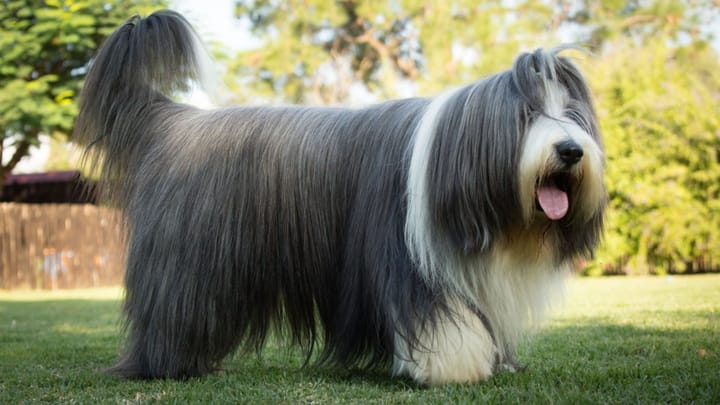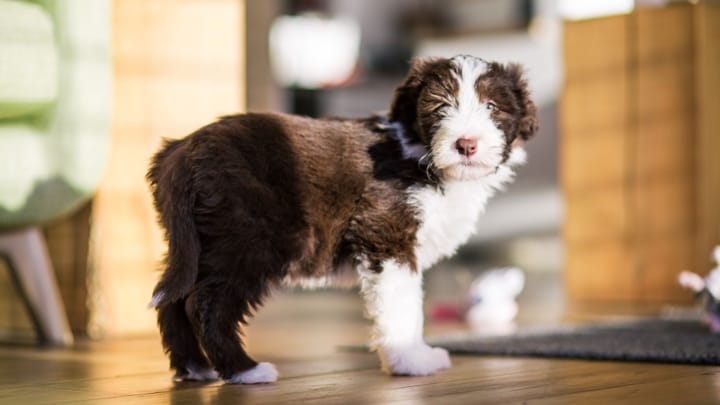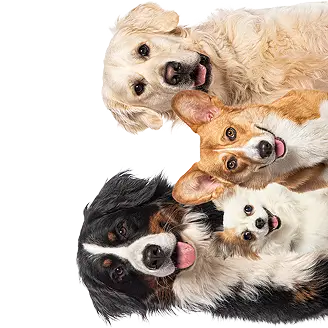Bearded Collie
Other name: Beardie


The Bearded Collie is intelligent and boisterous. Its stubbornness can be too much for some people and the dog needs almost constant attention to its fur: grooming will play a big part of the ownership of a Beardie. It is an independent dog but also loyal, exceptionally loving and demanding of human interaction. Here is a family dog for people who intend to be hands-on with their pet.
|
Life expectancy |
The Bearded Collie has a life expectancy of between 13 and 15 years |
|
Temperament |
|
|
Size |
Medium
|
|
Adult size |
Female
Between 20 and 21 in
Male
Between 21 and 22 in
|
|
Adult weight |
Female
Between 44 and 55 lb
Male
Between 44 and 55 lb
|
|
Coat colour
Beardies are born black, blue, fawn or brown. Some pups also have white markings. The colour of the fur of some members of the breed fades with age. |
Black Blue Red Brown Sand |
|
Type of coat
Long-haired. The rugged outer coat of the Beardie is weatherproof; beneath it is a thick, soft and insulating undercoat. |
Long |
|
Eye colour
General speaking, the colour of the eyes of the Bearded Collie match the colour of its fur (i.e. black, brown, blue (grey-blue eyes) or fawn). |
Brown
|
|
Purchase price |
The Bearded Collie costs between £415 and £760 |
Bearded Collies can be easily bored. If they are not played with, exercised and groomed regularly their behaviour will suffer. What’s more, Beardies that feel enclosed in gardens try to escape. Their ability to bounce gives them an advantage over other dogs when trying to jump over fences.
More details about the Bearded Collie
Bearded Collie: Origins and history
The first recorded evidence of Bearded Collies came in the late 1500s. It is believed that the Beardie came about after an influx of highly successful Polish sheepdogs into the Scottish highlands. These sheepdogs were bred with local Scottish dogs (that were already hardy) to produce the Beardie. The current popularity of the Bearded Collie is said to be due to the breed’s winning of Best in Show at Crufts in 1989.
Physical characteristics of the Bearded Collie
The Bearded Collie has a large head set on top of a robust and rectangular body; this gives the dog the impression of being ‘chunky’. Its eyes are set wide and high in its skull and ears are set close to the head. Its long tail is usually carried low.
FCI classification of the Bearded Collie
-
Group 1 - Sheepdogs and Cattledogs (except Swiss Cattledogs)
-
Section 1 : Sheepdogs
Bearded Collie: Characteristics
Bearded Collie: Behaviour
Training a Bearded Collie
A very easily trained dog is the Beardie. Training however must be done right: a confident master who is consistent and varies their style of training is essential. Bearded Collies get bored easily of routine. A Beardie will eventually do what it is told but will not necessarily do so in an expected fashion. The breed’s intelligence makes it a formidable pupil!
Bearded Collie: Lifestyle
Breed compatibility Bearded Collie
Bearded Collie: Purchase price
The price for a Bearded Collie can vary according to their age, gender and origins. Therefore, for a dog that is registered at the Kennel Club, they cost approximately £760.
Concerning your monthly budget to take care of a Bearded Collie, it can range between £100 to £150 per month.
Bearded Collie: Shedding
Heavy !
Bearded Collies do not moult excessively but they do moult. Because they do, they are not ideal dogs to be cared for by people suffering with allergies. Cutting short the coat of a Beardie does not alleviate the problem of shedding.
Bearded Collie: Grooming
Of a dog with such thick fur regular grooming is essential. In fact, the more frequent the grooming the better. Beardies should be brushed properly at least once a week for an hour to prevent their fur from becoming tangled, matted and uncomfortable.
Bearded Collie: Health
12 to 14 years.
Bearded Collies demand exercise regardless of the weather. Originating in Scotland the breed is robust and not prone to illnesses, chills or sickness.
The Bearded Collie will not tolerate hot weather. Its double coat will make it particularly unhappy during the summer months.
The double coat of the Bearded Collie keeps the dog warm even in the snow.
Weight gain can be a feature of the Beardie. Some of the breed have a huge appetite and will eat to obesity but others are very particular about their diet.
- Addison’s disease
- Autoimmune disease
- Degenerative or inflammatory arthritis
- External parasites
- Eye problems
- Hip dysplasia
- Skin problems







